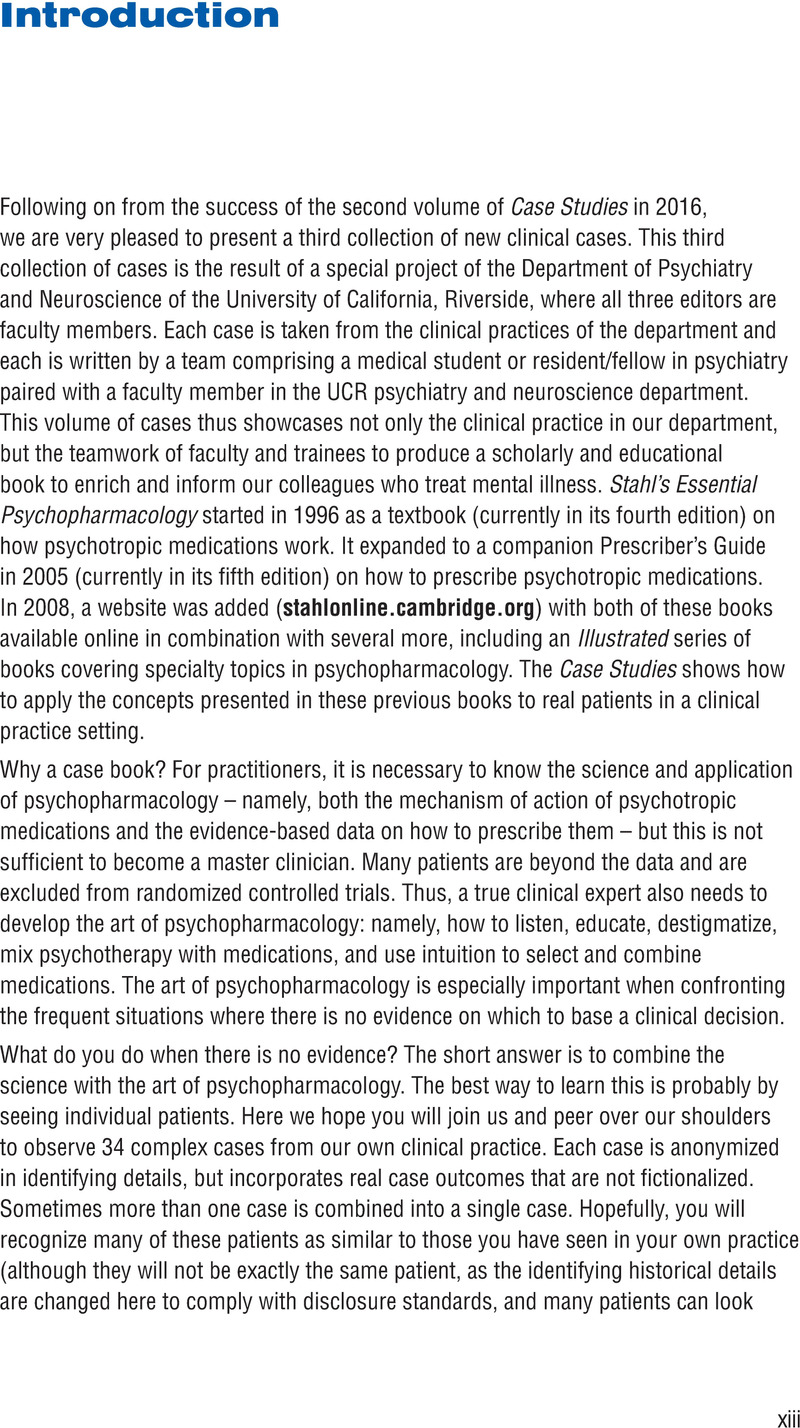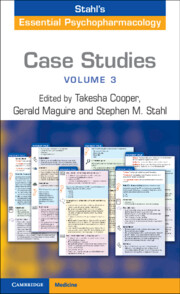Book contents
- Case Studies: Stahl’s Essential Psychopharmacology
- Case Studies Stahl’s Essential Psychopharmacology
- Copyright page
- Contents
- Introduction
- Contributors
- List of icons
- Abbreviations
- Case 1 Wearing down a diagnosis
- Case 2 The woman who couldn’t handle her lips smacking any longer
- Case 3 The depressed bipolar patient on multiple medications
- Case 4 The agitated patient who finally wasn’t
- Case 5 The George who was not psychotic but anxious and distracted
- Case 6 The man who saw enemies everywhere
- Case 7 The young woman with psychosis complicated by substance use and a history of traumatic brain injury
- Case 8 The woman with worsening psychosis and a mysterious rash
- Case 9 The man without a plan
- Case 10 The anxious depressed woman who couldn’t sit still
- Case 11 The man who thinks it’s the end of the world
- Case 12 Sunny with a chance of depression
- Case 13 A not-so-simple case of anxiety
- Case 14 I’m a woman in a man’s body
- Case 15 The spacey, fidgety son with overwhelming sadness
- Case 16 The man who spent thousands online
- Case 17 The traumatized mother who can’t stop bingeing
- Case 18 The man who couldn’t stop hitting people
- Case 19 Brexpiprazole: “an awakening”
- Case 20 Treatment-resistant depression and opioid dependence
- Case 21 A stiff patient
- Case 22 An adolescent awakening
- Case 23 The peace keeper with a left breast mass
- Case 24 The girl who slept with problems
- Case 25 Not all child’s play: a path to pediatric stability
- Case 26 The young woman who was “nothing but skin and bones”
- Case 27 Could it be both? Comorbid psychiatric diagnoses
- Case 28 Treatment-emergent mania/hypomania in a depressed patient
- Case 29 The border between mood and personality
- Case 30 The student who wanted to go to rehab
- Case 31 The boy who wouldn’t (couldn’t) listen
- Case 32 The patient who went streaking
- Case 33 “Perseverance”
- Case 34 Clozapine (Clozaril) candidate discombobulates compassionate clinicians
- Index of drug names
- Index of case studies
Introduction
Published online by Cambridge University Press: 19 October 2021
- Case Studies: Stahl’s Essential Psychopharmacology
- Case Studies Stahl’s Essential Psychopharmacology
- Copyright page
- Contents
- Introduction
- Contributors
- List of icons
- Abbreviations
- Case 1 Wearing down a diagnosis
- Case 2 The woman who couldn’t handle her lips smacking any longer
- Case 3 The depressed bipolar patient on multiple medications
- Case 4 The agitated patient who finally wasn’t
- Case 5 The George who was not psychotic but anxious and distracted
- Case 6 The man who saw enemies everywhere
- Case 7 The young woman with psychosis complicated by substance use and a history of traumatic brain injury
- Case 8 The woman with worsening psychosis and a mysterious rash
- Case 9 The man without a plan
- Case 10 The anxious depressed woman who couldn’t sit still
- Case 11 The man who thinks it’s the end of the world
- Case 12 Sunny with a chance of depression
- Case 13 A not-so-simple case of anxiety
- Case 14 I’m a woman in a man’s body
- Case 15 The spacey, fidgety son with overwhelming sadness
- Case 16 The man who spent thousands online
- Case 17 The traumatized mother who can’t stop bingeing
- Case 18 The man who couldn’t stop hitting people
- Case 19 Brexpiprazole: “an awakening”
- Case 20 Treatment-resistant depression and opioid dependence
- Case 21 A stiff patient
- Case 22 An adolescent awakening
- Case 23 The peace keeper with a left breast mass
- Case 24 The girl who slept with problems
- Case 25 Not all child’s play: a path to pediatric stability
- Case 26 The young woman who was “nothing but skin and bones”
- Case 27 Could it be both? Comorbid psychiatric diagnoses
- Case 28 Treatment-emergent mania/hypomania in a depressed patient
- Case 29 The border between mood and personality
- Case 30 The student who wanted to go to rehab
- Case 31 The boy who wouldn’t (couldn’t) listen
- Case 32 The patient who went streaking
- Case 33 “Perseverance”
- Case 34 Clozapine (Clozaril) candidate discombobulates compassionate clinicians
- Index of drug names
- Index of case studies
Summary

- Type
- Chapter
- Information
- Case Studies: Stahl's Essential Psychopharmacology , pp. xiii - xviPublisher: Cambridge University PressPrint publication year: 2021



